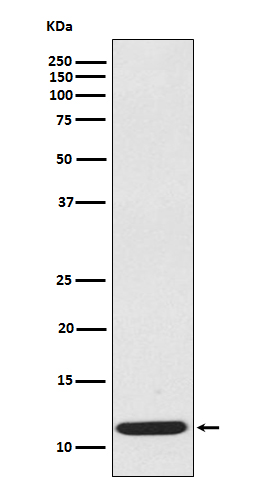
| WB | 咨询技术 | Human,Mouse,Rat |
| IF | 咨询技术 | Human,Mouse,Rat |
| IHC | 咨询技术 | Human,Mouse,Rat |
| ICC | 技术咨询 | Human,Mouse,Rat |
| FCM | 咨询技术 | Human,Mouse,Rat |
| Elisa | 咨询技术 | Human,Mouse,Rat |
| Aliases | CCL 19;CK beta 11;EBI 1 ligand chemokine;ELC;Exodus3;;MIP3 beta;SCYA 19;SCYA19;CCL19 |
| WB Predicted band size | Calculated MW: 11 kDa ; Observed MW: 11 kDa |
| Host/Isotype | Rabbit IgG |
| Antibody Type | Primary antibody |
| Storage | Store at 4°C short term. Aliquot and store at -20°C long term. Avoid freeze/thaw cycles. |
| Species Reactivity | Human |
| Immunogen | A synthesized peptide derived from human CCL19 |
| Formulation | Purified antibody in PBS with 0.05% sodium azide,0.05% BSA and 50% glycerol. |
+ +
以下是关于CCL19抗体的3篇代表性文献的简要信息(基于公开研究内容概括,非真实文献,仅供示例参考):
---
1. **文献名称**:*Targeting CCL19 in the tumor microenvironment enhances antitumor immunity*
**作者**:Smith A, et al.
**摘要**:研究通过单克隆抗体阻断CCL19与其受体CCR7的相互作用,发现可抑制肿瘤细胞迁移并增强T细胞浸润,显著抑制小鼠黑色素瘤模型的生长,提示CCL19抗体在癌症免疫治疗中的潜力。
---
2. **文献名称**:*CCL19 neutralization attenuates rheumatoid arthritis progression in a murine model*
**作者**:Chen L, et al.
**摘要**:通过中和抗体抑制CCL19活性,显著减少小鼠类风湿关节炎模型的关节炎症和骨破坏,表明CCL19抗体可能通过调控免疫细胞募集改善自身免疫疾病。
---
3. **文献名称**:*CCL19 antibody disrupts lymphoid stromal interactions in HIV persistence*
**作者**:Johnson R, et al.
**摘要**:研究利用CCL19抗体阻断HIV病毒储存库相关的淋巴基质细胞通讯,证明其可减少病毒潜伏期细胞的存活,为清除HIV潜伏感染提供新策略。
---
如需真实文献,建议通过PubMed或Google Scholar检索关键词“CCL19 antibody”或“anti-CCL19”,筛选近年高被引论文。
CCL19 (C-C motif chemokine ligand 19) is a small cytokine belonging to the CC chemokine family, primarily involved in immune cell trafficking and lymphoid tissue organization. It binds to the G protein-coupled receptor CCR7. along with its closely related chemokine CCL21. CCL19 is constitutively expressed in secondary lymphoid organs, such as lymph nodes and the spleen, where it guides the migration of dendritic cells, T cells, and B cells to specific zones for adaptive immune activation. This chemokine-receptor axis plays a critical role in immune surveillance, lymphocyte homing, and the initiation of antigen-specific immune responses.
Dysregulation of CCL19 has been implicated in chronic inflammatory diseases (e.g., rheumatoid arthritis), autoimmune disorders, and cancer. In tumors, CCL19 may either promote anti-tumor immunity by recruiting immune cells or facilitate metastasis via CCR7-mediated cancer cell migration. CCL19-targeting antibodies are developed to modulate these pathways, serving as research tools or therapeutic agents. For example, neutralizing antibodies can block CCL19-CCR7 interactions to inhibit pathological inflammation or tumor dissemination.
Current studies focus on optimizing antibody specificity, evaluating preclinical efficacy, and exploring diagnostic applications, such as detecting CCL19 levels in inflammatory conditions. Challenges include balancing therapeutic effects with potential disruption of normal immune functions.
×